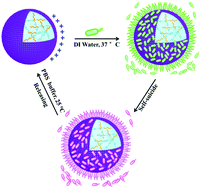Engineering proteinosomes with renewable predatory behaviour towards living organisms†
Abstract
Communication is a fundamental feature of life, and all living organisms interact actively with their surroundings to better their chance of survival through the coordination of group behavior. To develop mutual interactions between an artificial cell and living organism, we constructed a positively charged thermo-sensitive proteinosome with loaded L-arginine modified chitosan oligosaccharide as an antimicrobial in the hydrogel-based core domain, and then by controlling the temperature and ionic strength we demonstrate that changes in both the hydrophobicity and the electrostatic attraction allowed the constructed proteinosomes to show a programmed interaction with the living organism E. coli, including capture, aggregation induced self-suicide, release, and then the renewal of the proteinosomes. It is anticipated that our results will contribute to the development of the communication behaviours within artificial cell and living organism hybrid microsystems, and lay a foundation for further engineering artificial cell models towards biology inspired materials.

- This article is part of the themed collection: Horizons Community Board Collection: Antimicrobial materials and surfaces


 Please wait while we load your content...
Please wait while we load your content...